WHO's Protected Species: A Look at the Importance of Biodiversity Conservation
As humans, we often forget the importance of biodiversity and its impact on our overall well-being. The World Health Organization (WHO) recognizes the vital role that biodiversity plays in human health and has identified several protected species that require our attention and protection to ensure their survival. In this article, we will explore the significance of biodiversity and the importance of protecting WHO's identified protected species.
The Significance of Biodiversity
Biodiversity refers to the variety of life on Earth and the ecological and evolutionary processes that sustain it. It encompasses not only the diversity of species, but also genetic diversity within species, and the diversity of ecosystems. The importance of biodiversity cannot be understated, as it provides numerous benefits, including:

Regulating the planet's climate and water systems
Providing food, medicine, and natural resources
Supporting recreational activities and providing cultural importance
Protecting against natural disasters such as floods and landslides
Providing crucial ecosystem services such as pollination and pest control
Despite its significance, biodiversity is under threat from various human activities, including habitat loss, pollution, overexploitation, and climate change. Therefore, it is essential to protect and sustainably manage biodiversity to ensure its long-term existence and the continued provision of its benefits.
WHO's Protected Species
The WHO has identified several protected species that require urgent conservation attention due to the threat to their survival. These species include:
African Wild Dog - a highly endangered species due to habitat loss, disease, and poaching
Bengal Tiger - threatened by habitat loss and poaching for fur and traditional medicine
Chimpanzee - threatened by habitat loss and hunting for bushmeat
Asian Elephant - threatened by habitat loss and poaching for ivory
Giant Panda - threatened by habitat loss and low reproductive rates
These species are just a few of the many that require protection to ensure their survival. By protecting these species, we can help preserve the biodiversity of the planet and ensure the continued provision of its benefits.
The Importance of Conservation Efforts
Conservation efforts play a crucial role in protecting biodiversity and the species that inhabit our planet. This includes protecting habitats, developing sustainable practices, practicing responsible tourism, and enforcing laws and regulations to prevent poaching and illegal wildlife trade.
Conservation efforts can also provide economic benefits, such as ecotourism and sustainable resource use, which can support local communities while protecting traditional cultures and practices.
It is essential to recognize that all species, not just those identified by the WHO, play a vital role in maintaining the health and functioning of the planet's ecosystems. Every species has a unique role to play, and the loss of even a single species can have significant impacts on the ecosystem's overall health.
In conclusion
Biodiversity is essential to the health and well-being of our planet and its inhabitants. The WHO's identified protected species represent just a few of the many species that require our attention and protection. Conservation efforts must be prioritized to ensure the continued existence of these species and their associated benefits to humans. By working together to protect biodiversity, we can ensure a healthier, more sustainable planet for future generations.



